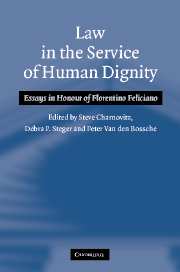Book contents
- Frontmatter
- Contents
- List of contributors
- Preface
- Biographical note
- List of abbreviations
- PART I Reflections on the contributions of Florentino Feliciano to international law
- 1 A judge's judge: Justice Florentino P. Feliciano's philosophy of the judicial function
- 2 The benign first mate
- 3 The Aristotelian
- 4 Trade and economic justice according to law
- PART II Insights into the World Trade Organization
- PART III The changing landscape of investment arbitration
- PART IV New challenges in international adjudication
- Bibliography of works by Florentino Feliciano
- Index
1 - A judge's judge: Justice Florentino P. Feliciano's philosophy of the judicial function
from PART I - Reflections on the contributions of Florentino Feliciano to international law
Published online by Cambridge University Press: 29 July 2009
- Frontmatter
- Contents
- List of contributors
- Preface
- Biographical note
- List of abbreviations
- PART I Reflections on the contributions of Florentino Feliciano to international law
- 1 A judge's judge: Justice Florentino P. Feliciano's philosophy of the judicial function
- 2 The benign first mate
- 3 The Aristotelian
- 4 Trade and economic justice according to law
- PART II Insights into the World Trade Organization
- PART III The changing landscape of investment arbitration
- PART IV New challenges in international adjudication
- Bibliography of works by Florentino Feliciano
- Index
Summary
Florentino P. Feliciano is a towering scholar in international law. He has written authoritatively in virtually every area of international law and legal theory, from the law of the sea and, especially, the problems of archipelagos, to human rights law, where his work on refugees and coerced movements of peoples is remarkable for its insights, to environmental law, international economic law, and the law of war, in which his magisterial work with Myres S. McDougal continues to be the essential vade mecum for practitioners and students. A student who knew Feliciano only from his extraordinary corpus of written work would have expected a scholar, stockaded behind books in some corner of an ivory tower, jealous of every minute that could be devoted to even more scholarly inquiry. That student would be surprised to encounter quite a different person, for Feliciano has been anything but retiring. He has been an outstanding teacher, practitioner, diplomat, citizen of his country, region and the world, and, above all, judge.
Every role that Feliciano has played has enriched his scholarship and his scholarship has analysed and reflected on each successive role for which he has been a participant-observer. But the role of judge has been central to his intellectual evolution. Indeed, long before he was a Justice of the Philippine Supreme Court and long before he was the Chair of the seven Members of the Appellate Body of the World Trade Organization, the most striking impression that Feliciano made on one was his judiciousness.
- Type
- Chapter
- Information
- Law in the Service of Human DignityEssays in Honour of Florentino Feliciano, pp. 3 - 10Publisher: Cambridge University PressPrint publication year: 2005
- 1
- Cited by



